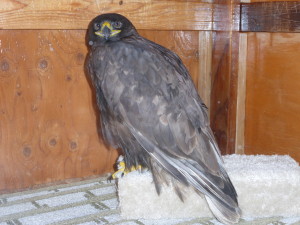One of our newest admissions of the New Year is a stunning, adult dark morph Ferruginous hawk that was found on the ground out on the northeastern plains of Colorado near the town of Padroni. This bird was found Sunday and transported by Colorado Parks and Wildlife District Wildlife Manager Aimee Ryel to Briggsdale, CO on Monday evening (1/5) where the bird was handed off to one of our Rehabilitation staff for the final leg of the trip to Fort Collins.
the New Year is a stunning, adult dark morph Ferruginous hawk that was found on the ground out on the northeastern plains of Colorado near the town of Padroni. This bird was found Sunday and transported by Colorado Parks and Wildlife District Wildlife Manager Aimee Ryel to Briggsdale, CO on Monday evening (1/5) where the bird was handed off to one of our Rehabilitation staff for the final leg of the trip to Fort Collins.
On admit the hawk was alert, but found to be weak, emaciated, dehydrated and had signs of resolving head trauma. She (based on size) also had a crop full of food that the Good Samaritans who found her on Sunday had given her. Unfortunately in her diminished state she was unable to process this food, so it sat in her crop and began to sour. Our admit staff had to manually and gently, remove the food with hemostats. Piece by piece the sour chicken was pulled out. After that the bird was given subcutaneous fluids to help rehydrate her and then she was placed in one of our oxygen cages for the night. The next morning she was standing and it was obvious by all of the poop in the cage that she processed any remaining food in her system. More fluids and small meals were on her treatment schedule for the rest of the day.
This morning (Wed) as part of regular monitoring for Lead in certain target species of raptors that we see, a blood sample was taken and tested. Unfortunately the results weren’t what we were hoping for. With our Lead testing machine, anything above 65 micrograms/per cubic deciliter registers as HIGH and that is what her Lead level is. Low would be less than 3.3 and we usually treat anything above 15 or if a bird shows neurological signs and has an elevated Lead level. Immediately we began to treat the bird with an injectable chelating agent that will help remove the Lead from her body. She will receive this medication twice a day for the next 5 days, then rest for 5 days and then the process will be repeated. After these two rounds of treatment we will re-test her blood and if necessary, continue the medications until her blood Lead level is within an acceptable range (3.3-10). She will also continue to receive other supportive care such has subcutaneous fluids to keep her well hydrated and lots of nutritious food.
Raptors have highly efficient digestive systems and are poisoned from ingesting Lead while scavenging on dead animals that were shot and not retrieved.
Treating Lead poisoning in raptors is a labor and resource intensive process and our experience with these types of cases tells us that this one is going to take awhile.
